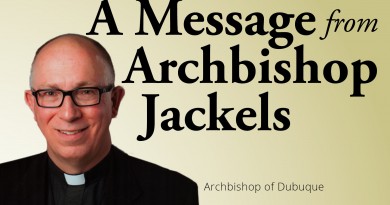The role of the Eucharist in prayer and adoration
In a series of columns during Lent, I offered some reflections on prayer in general, and in particular on praying with the Rosary, and the Scriptures.
I had also mentioned praying in adoration of the Holy Eucharist.
After Mass, the Blessed Sacrament is kept in the tabernacle so that it can be taken to people who are sick or homebound, as well as to inspire and be the object of prayer.
We can stop in a Catholic church for a short visit to Jesus in the Blessed Sacrament: make a genuflection, kneel down, and pray for a special intention, or to say sorry for our sins, or to thank God, or just to say I love you to God.
Or we can spend a longer time in prayer, sitting or kneeling in adoration of Jesus present in the Holy Eucharist kept in the tabernacle, maybe praying the Rosary, or doing lectio divina, or in silent contemplation.
And sometimes the Eucharist is taken out of the tabernacle and placed in a vessel called a monstrance (from the Latin, “to show”), so that the Sacred Host can be seen. When people talk about Eucharistic Adoration, this is usually what they mean.
The Host reserved in the tabernacle for prayer should be periodically replaced and consumed. That follows from our belief that the ultimate and essential end of the Blessed Sacrament, for which Jesus instituted the Eucharist, is to be consumed.
That is also I think the ultimate and essential end of Jesus’ followers: to be consumed by Christ, or as St. Paul put it, to be “grasped by Christ Jesus,” to be “taken captive by God to do his will.”
We are brought to this point, to this desire, by spending time in adoration of the Blessed Sacrament, and thereby growing in the desire to worship at Mass and to receive Holy Communion worthily, and to serve the poor.
We can’t draw near to the fire of divine love “sacramentalized” in the Eucharist and not be grasped, taken captive, consumed.
St. Catherine of Siena warned of this in her book entitled “Dialogue”: “What heart can defend itself and not burst to see greatness humbling itself to the lowliness of our humanity?”
Some people fear that this devotion will take away from the centrality and importance of the Mass. But I think the fear is unfounded.
It’s like the picture in my room of my family. They live in California. The picture reminds me of them, keeps the flame of love alive for the times when I go out there to be with them. I would never stop visiting, relating, and content myself with looking at a photo.
Adoration of the Holy Eucharist has the effect of increasing the desire to go to Mass, even daily, and to participate fully, consciously and actively, and to receive Holy Communion.



